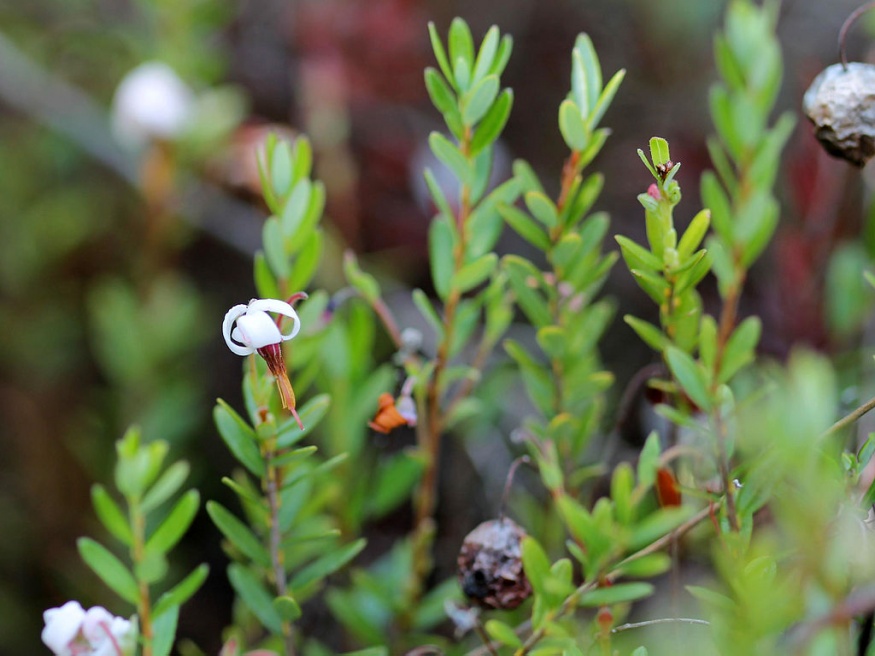About
American cranberry is a low growing, trailing, evergreen shrub native to the temperate zones of eastern North America. As a woody perennial vine, it spreads by rhizomes one to six feet in length, forming a thick mat. It's found in wet bogs with acidic soil, tolerates wet feet, but should normally be well drained during the growing season. Because the plant thrives on a special recipe of soils made in wetlands, it requires unique soil and growing techniques when grown comercially as a food crop.
Glossy, leathery, ovate leaves densely cover branches; undersides are whitish. This perennial keeps its leaves in the winter turning copper to purple an is considered a broadleaf evergreen. Short, leaf bearing vertical branches protrude from low runners. These hold, flowers and fruit usually near their tips. Fuchsia pink blooms occur from May to June, are self pollinating, and attract pollinators. Red to dark purple half inch diameter berries follow and mature from August to November. The fruit is eaten by birds and and sometimes small animals; leaves are food for the bog copper butterfly.
Transplanting is difficult and the shrub is susceptible to a number of pests and diseases. It does best in best in full sun, tolerates part shade, and is not tolerant of heat and drought. For these reasons, along with the special water and soil requirements, American cranberry considered a somewhat high maintenance plant to grow.
References
Canadensys. (2020). Vaccinium macrocarpon Aiton. Retrieved from http://data.canadensys.net/vascan/taxon/5571
Missouri Botanical Garden. (n.d.). Vaccinium macrocarpon 'Thunderlake'. Retrieved from http://www.missouribotanicalgarden.org/PlantFinder/PlantFinderDetails.aspx?taxonid=254143&isprofile=0&pt=7
University of Massachusetts Amherst. Natural History of the American Cranberry, Vaccinium macrocarpon Ait. Retrieved from http://www.umass.edu/cranberry/downloads/nathist.pdf
Natural Resource Conservation Service. (n.d.). Vaccinium macrocarpon Aiton. Retrieved from https://plants.usda.gov/core/profile?symbol=VAMA
NC State Extension. (n.d.). Vaccinium macrocarpon. Retrieved from https://plants.ces.ncsu.edu/plants/vaccinium-macrocarpon/
Growing From Seed
Growing from seed is one of the most economical and satisfying ways to build a native plant garden. The table shows brief planting instructions, including how long and what kind of stratification this plant needs. For further information on stratification and seed preparation please refer to our article: Preparing To Grow Wild Plant Seeds
| Seeds/Packet | Coming soon... |
|---|---|
| Seeds/Gram | Coming soon... |
| Cost/Gram | $Price coming soon... |
| Dormancy Treatment | Coming soon... |
| Seeding Instructions | Coming soon... |
Growing From Plants
Seedlings are a more economical option than established plants and an easier start than growing from seed. 4 pack plants indavidually have and approximate 2" square root ball. We also have large soil block plants, which are a bit more established than the seedlings. These grow as approximate 4" blocks. Plants do surprizingly well in the mail but need special care upon arrival. Please see Planting Mail Order Seedlings for information on how to plant and care for seedlings.
Shipping
We currently ship seeds to all Canadian provinces and ship plants just within the provinces of British Columbia and Alberta. Seeds ship year-round and usually take a few days (or longer if you are ordering from a distant province). It usually takes 2-5 business days in the mail for plant orders once shipped. Plants are generally available from May to September and can be reserved during off season; Shipping costs are calculated during checkout. Seed orders over $100 ship free! See Shipping for more details.
-312.jpg)

-314.jpg)